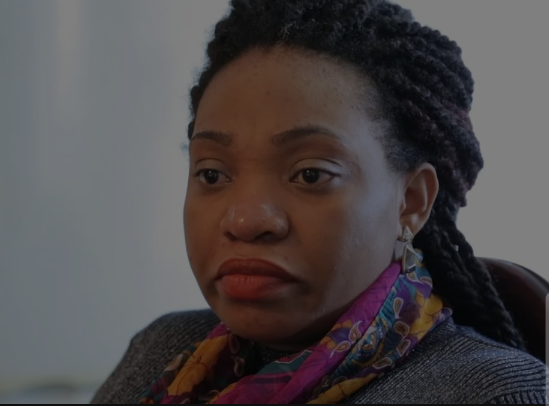
“Enough of Your Theatrics!” — Uchechi Kanu Slams Messengers Who Broke Husband’s Transfer News Online Before Informing Her

In a dramatic turn of events that has stirred intense conversation across Nigeria’s digital sphere, Uchechi Okwu-Kanu, the wife of detained IPOB leader Nnamdi Kanu, has issued a stern public warning to those who hurriedly took to social media to announce her husband’s transfer to Sokoto prison without first notifying her. Her message, delivered with a mix of frustration, authority, and emotional strain, has become one of the most discussed posts of the day, reflecting the charged atmosphere surrounding her husband’s long-running legal and political ordeal.
According to her statement, Uchechi learned about Nnamdi Kanu’s arrival at Sokoto prison roughly three hours before she made the post. What struck her most was not the transfer itself — an event heavy with implications — but the manner in which the information was handled. She revealed that individuals who visited her husband earlier in the day failed to update her directly, opting instead to “run to social media” to broadcast the news. The announcement quickly spread across platforms, amplified by popular news pages and blogs, before the person most directly affected received any official or personal briefing.
Visibly angered by what she described as unprofessional and insensitive behaviour, Uchechi delivered a strongly worded rebuke: “Enough of your theatrics! If you all do not sit up and behave in a civilised and professional manner, I will stress you with my ‘stress’ and I promise you, you will be stressed. Be warned!” The intensity of her language, uncharacteristically blunt even by the chaotic standards of Nigerian digital discourse, underscored just how deeply the situation had shaken her.
Her reaction opens a wider conversation about the human toll of high-profile legal cases in Nigeria, especially those involving political figures whose lives are under constant public scrutiny. For years, Nnamdi Kanu’s legal battles, arrests, transfers, and detention conditions have been dissected and debated online, often becoming instantaneous media sensations. Every update, no matter how small, triggers a wave of reposting, commentary, and speculation. Yet behind the headlines and hashtags are family members whose emotions and well-being often go overlooked.
Uchechi’s outburst speaks directly to that tension. Information about her husband’s welfare — be it location, health, or legal status — carries enormous emotional weight. To discover such updates from blogs and timelines instead of from those who physically visited him only added to the strain she has endured since Kanu’s detention began. Her message was not just a reprimand but a reminder that basic courtesy and respect should still exist, even in situations charged with political meaning and public interest.
Her post has since sparked conversation from supporters and critics alike. While many sympathised with her frustration, calling the behaviour of the visitors disrespectful and irresponsible, others argued that once information enters the public domain, it becomes part of a broader conversation—especially concerning a figure as influential and controversial as Nnamdi Kanu. Still, the overwhelming sentiment online appears to favour the idea that families deserve direct communication before any major updates are made public.
The emotional undertone of Uchechi’s message also reintroduces a consistent theme in discussions surrounding Kanu’s case: transparency. His transfer to Sokoto, a location considered geographically and logistically distant for many of his supporters and family members, immediately raised concerns about accessibility, legal representation, and visitation rights. Each new move sparks a period of uncertainty, and with that uncertainty comes anxiety. For Uchechi, whose posts often reflect the personal struggles behind the headlines, the lack of proper communication was a blow she felt deeply.
Observers have noted that her message is also a clear call for order among those within Kanu’s support network. The messy, theatrical behaviour she referenced hints at internal fractures — individuals or groups seeking clout, relevance, or online attention by being the first to break news, even at the expense of courtesy. Her warning served as a reminder that sensitive information surrounding Kanu should not become a tool for social media engagement, especially not at the emotional expense of his immediate family.
As the conversation continues to unfold, many Nigerians have taken this incident as a reflection of larger issues in the way information is handled in the digital age. In a society where breaking news often travels faster than the truth, personal boundaries are frequently violated. This case is yet another example of emotional injury caused not by official actions, but by the reckless rush to post first and verify later.
Meanwhile, Uchechi’s display of anger has also highlighted her resilience. Over the years, she has been a calm but firm voice, advocating for her husband’s rights, updating supporters, and keeping attention on his legal journey. Her message this time, however, broke through with raw emotion, signalling the exhaustion of someone who has been forced to navigate a relentless and unpredictable situation. Her remark — “I will stress you with my stress” — while forceful and almost humorous in tone, underscores the depth of fatigue and frustration she has carried.
As news about Nnamdi Kanu’s transfer continues to dominate online discussions, the central question remains about what this latest move means for his legal prospects and the ongoing political tensions surrounding his detention. But beyond those larger implications, the spotlight today rests firmly on the personal—on the woman who has found herself repeatedly thrust into the public eye, fighting for both her husband and her peace.
For now, Nigerians continue to react strongly to Uchechi’s post, debating its tone, its message, and the broader issues it signifies. But one thing is undeniable: her warning has been heard loud and clear. Whether it will change the behaviour of those she addressed is another matter entirely. What is certain is that her words have reinjected a human voice into a narrative that is too often dominated by speculation, drama, and political noise.
In a digital landscape where everyone is racing to break the story first, Uchechi Kanu’s message stands as a reminder that behind every headline is a person navigating fear, uncertainty, and emotional turbulence. And for her, the theatrics must stop.


